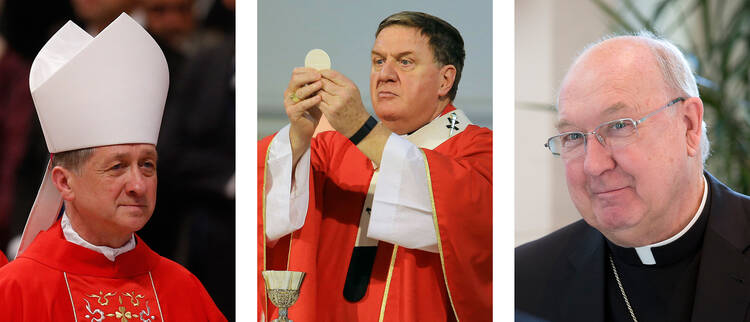Sometimes Pope Francis’ actions are even more eloquent than his words. His decision to create three new American cardinals—Blase J. Cupich, Kevin J. Farrell and Joseph W. Tobin—is a case in point. It was a pondered decision, the fruit of months of prayerful reflection, consultation and discernment. It contained a clear message to the Catholic Church in the United States and, more specifically, to its bishops.
To grasp the full dimensions of that message, it is essential to read carefully Francis’ address to the U.S. bishops in St. Matthew’s Cathedral, Washington D.C., on Sept. 23, 2015, in which he identified specific characteristics that a pastor in the United States should have today.
It is also necessary to read his talks to the apostolic nuncios in June 2014 and June 2016, and especially his important talk to the Congregation for Bishops on Feb. 27, 2014, in which he spelled out the qualities that a candidate to be bishop should possess. These include being a man of deep prayer; humble, not ambitious; not attached to status, privilege or money; pastors “with the smell of the sheep” and a simple lifestyle, not princes; men who are close to the poor and those on the margins of life; pastors who are merciful, not judgmental; men of dialogue, not confrontation.
By naming three new cardinals from the United States, Francis is first of all expressing his high esteem, love and encouragement for the American church. Not since Paul VI in 1967 has a pope named so many American cardinal electors at the same time. But there is something more in his message, a pressing invitation to the U.S. bishops to walk together with the one whom the Holy Spirit has chosen as the successor of Peter to lead the church.
The Second Vatican Council teaches that when a man is ordained bishop, he becomes a member of the college of bishops, with and under the successor of Peter (“cum Petro, sub Petro”). Henceforth he is called to work with Peter, not distancing oneself from him, much less working against him or hoping for a quick end to his pontificate.
The same is true when one becomes a member of the College of Cardinals. He is called to be the pope’s adviser, not his opponent or critic. But as the past and recent history of the church shows, including in the United States, not every bishop or cardinal sees his role in this light.
This is the context in which Francis has given the U.S. church three new cardinal electors. In doing so he is inviting American bishops to row with him as these three are doing. He first issued that invitation last year in St. Matthew’s Cathedral in Washington, D.C., when he spoke to them “as the bishop of Rome, called by God in old age and from a land which is also American, to watch over the unity of the universal church and to encourage in charity the journey of all the particular churches toward ever greater knowledge, faith and love of Christ.”
On that occasion, he called the U.S. bishops to be “promoters of the culture of encounter” and told them “dialogue is our method, not as a shrewd strategy but out of fidelity to the One who never wearies of visiting the marketplace, even at the 11th hour, to propose his offer of love (Mt 20:16).”
He urged them to “dialogue among yourselves, dialogue in your presbyterates, dialogue with lay persons, dialogue with families, dialogue with society.” He encouraged them “to dialogue fearlessly,” to avoid using “sharp and divisive language” and to share the faith with others candidly but “with humility,” because “otherwise, we fail to understand the thinking of others, or to realize deep down that the brother or sister we wish to reach and redeem, with the power and the closeness of love, counts more than their positions, distant as they may be from what we hold as true and certain.” Earlier, in his speech to Congress, he showed how this can be done.
By choosing Archbishop Cupich, Bishop Farrell and Archbishop Tobin as cardinals, Pope Francis is telling the world that he considers them to be pastors with the qualities he listed in his talks to the nuncios and to the Congregation of Bishops, as well as those extra traits he highlighted in St. Matthew’s Cathedral as essential for a bishop in the United States today.








